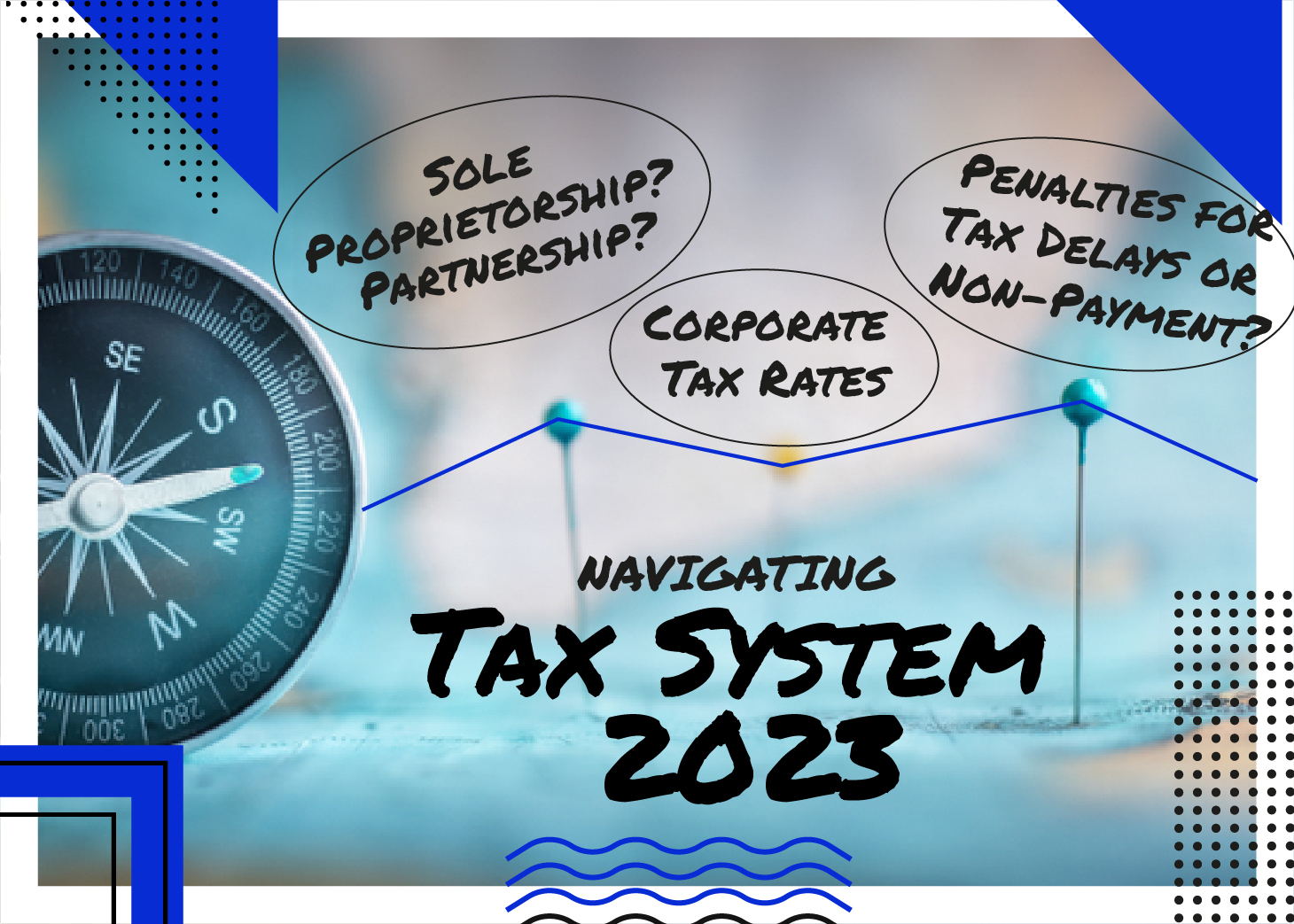
Navigating the Current Tax System for 2023: A Guide to Incorporating in Singapore
Singapore is often highlighted as a leading example of a country that continues to lower corporate income tax rates and implement different tax incentives in order to attract and retain global investments. Singapore has a territorially based single-tier fixed corporate income tax structure. Singapore’s effective tax rates, which are among the lowest in the world, and the city-state’s general “business friendly” are two major elements contributing to economic growth and foreign investment in the city-state.
If you’re looking to incorporate your SME in Singapore, you need to have a solid understanding of the tax requirements and regulations to ensure you remain compliant and avoid any costly fines. This is especially true if you’re planning to incorporate in 2023, as the current tax system is undergoing some significant changes.
It can be mind boggling for SMEs owners, especially those who are unfamiliar with how tax systems operate. But don’t worry, we’ve got you covered with this comprehensive guide on navigating the current tax system for 2023 when it comes to incorporating in Singapore. This article gives a full explanation of Singapore corporations’ income tax rates, tax system, and tax benefits. We’ll also provide some useful tips and strategies for making sure your business remains compliant under Singapore’s new regime. So, let’s gets our hands down on understanding cycle of taxation.
Options for Incorporating Your SME: Sole Proprietorship, Partnership or Company?
If you’re a small-medium enterprise generally named as SME hoping to incorporate your business in Singapore, you have three main options: sole proprietorship, partnership or company.
- Sole Proprietorship
A sole proprietorship is the simplest and most affordable way to incorporate your business. As the name suggests, this setup needs just one person holding control and ownership of a business. This option is well-suited for small businesses with low capital requirements or single-person operations.
- Partnership
In a partnership, two or more people share control and ownership of a business whereas each partner is liable for all debts or losses. Depending on the type of partnership setup choose, partners can be responsible for the actions of their fellow partners also, so it’s important to be careful when choosing partners.
- Company
The most popular choice among SMEs in Singapore is the company setup. Companies are considered separate legal entities in the eyes of the law, providing considerable protection from personal liability to shareholders and directors. They also have no fixed limit on maximum capital requirements or maximum number of shareholders. Also, to bring in your notice that this comes at a higher cost than other incorporation options.
Registering for Corporate Tax in Singapore: Form C-S/C and More
As a small to mid-sized business owner, understanding the corporate tax regulations in Singapore can be as tough as mathematical equation. The good news is that it doesn’t have to be. The Form C-S/C is your guide for navigating Singapore’s corporate tax requirements. It provides guidance on different portions of the tax system, such as assessing and budgeting for taxes due, filing deadlines, and other details related to meeting your company’s obligations under the current system.
To file your Form C-S/C, you’ll need to provide information such as your company’s revenue and expenses, its capital profits or losses from transactions within and outside of Singapore, bank interest from deposits held in Singapore and any other income received from investments held within or outside of Singapore.
Your company must also declare any payments sent or received related to rent, salaries or dividends. This will help you determine how much tax you may owe for the current year. To ensure compliance with new regulations taking effect in 2023, it’s best to consult with an experienced accountant who can guide you through the process.
Projected Corporate Tax Rates and Requirements for 2023
Starting a business in Singapore requires a great deal of planning and foresight, especially when it comes to tax requirements. Fortunately, the government has provided several aids for businesses to understand the system and help them handle their taxes responsibly.
Tax rates for newly incorporated in Singapore is less as compared to other countries, and currently stand at only 8.5% for companies with an annual income of up to SGD 100K and 17% for businesses with profits over SGD 100K annually.
In 2023, the estimated corporate taxes are estimated to be even lower:
- Full 100% tax exemption on the first earning of SGD100,000 per annum and an additional 50% exemption on the next $190,000 of normal chargeable income.
- Companies with an annual income between SGD 200- 300K will pay 8.25% on the first $200K earned and 17% on subsequent earnings.
- Companies with an annual income exceeding SGD 300K will pay 25%.
These projected changes provide SMEs with peace of mind when it comes to navigating the tax system in Singapore, knowing that guidelines are likely to become more lenient over time.
GST for Businesses and Thresholds for 2023
Other than corporate income tax, companies might need to pay goods and services tax (GST). In Singapore, companies that are incorporated and operating a business must register for the Goods and Services Tax (GST). This means that it is important to consider the GST implications before incorporating a business in Singapore. In 2023, the GST rate is set at 7%, meaning that there is no requirement to pay GST for any sales.
Businesses must take into account the thresholds for GST registration in 2023. All businesses with an annual taxable income of more than SGD$1 million or a global turnover exceeding SGD$1 million are required to register for GST. There are also certain types of businesses that must register regardless of their income level, including telecommunications service providers and financial institutions.
By understanding the changes to the tax system in Singapore in 2023, businesses can make informed decisions when incorporating and planning for their future growth.
Complying With Ongoing Filing Requirements: Form C, Tax Returns and Audits
Once you have incorporated your SME in Singapore, you must comply with ongoing filing mandates that vary depending on the size of your business. Starting a business in Singapore requires more than just incorporating, you’ll need to understand and comply with all the related Singapore government regulations that come into play. Depending on your situation, some of the requirements you will need to keep up with include:
- Form C
You must submit a Form C to IRAS which is responsible for taxation on companies in Singapore, every year for each company director and officer for all companies. You are required to file this form whether or not there is any taxable income, and it must be filed on or before the 15th day of the 2nd month following the end of each financial year.
- Tax Returns
Every year, your company must file a corporation tax return. This return, together with supporting documentation such as audited accounts and income tax calculation, must be filed within three months after the end of the financial year. The returns and related papers must be available for examination within three years of the date they were submitted.
- Audits
Depending on certain criteria such as average annual revenue, your company might be required to carry out an audit by a qualified auditor for each financial year. It is important that an audit report is submitted within one month from the end of the financial year so that your company can comply with its filing requirements in a timely manner.
Qualifying for Tax Exemptions and Incentives as an SME
By taking advantage of the various tax incentives available to SMEs, you can streamline your business operations and save some dollars. Here are some of the incentives available:
- Companies with a taxable income of SGD100,000 or less will be fully exempt from CIT (Corporate Income Tax).
- Businesses can enjoy a tax deduction for certain overseas expenses related to their business operations.
- Internationalisation Double Tax Deduction allows SMEs to claim double tax deductions on qualified expenses such as international market development activities, overseas growth charges, and more.
By understanding the current tax system and using tax incentives available to your advantage, your business will be better placed towards success in the local competitive market.
What Are the Penalties for Tax Delays or Non-Payment?
Late payment of corporation tax may result in a 5% penalty, with an additional 1% penalty for each month the tax stays due, up to a 12% penalty. IRAS may also take legal action or conduct further enforcement to retrieve the unpaid tax.
In the case of tax evasion, a case will be opened if someone intentionally provides IRAS with incorrect or insufficient information regarding company operations in order to lower tax burden or get excessive tax credits and refunds.
Tax evasion is a serious criminal violation that might take 15 to 24 months to investigate. IRAS will organise meetings with the firm in question to discuss the findings of the investigations. Penalties may then be applied in accordance with the company’s cooperation in the inquiry and the aim to cheat taxes.
Penalties in cases where there was an intent to dodge taxes might include:
- Fines of up to SG$50,000 are possible.
- Financial penalties of up to 400% of the undercharged tax
- The relevant person can face up to 5 years in jail.
Updates to Singapore’s Corporate Tax Regime for 2023
Special Tax Breaks for different industries are stated below:
Additional deduction of 100% on up to SGD100,000 of qualifying intellectual property registration costs until the year of assessment 2025 for technology industry.
The financial sector incentive (FSI) plan applies to licenced financial firms including banks and investment managers. The FSI system offers tax breaks of 5%, 10%, 12%, or 13.5% on revenue earned by an FSI firm from eligible activities. The present concessionary tax rates would be reduced to 10% and 13.5% for new and renewal awards authorised on or after January 1, 2024, according to the Singapore Budget 2023.
The global trader programme (GTP) plan which applies to enterprises involved in the worldwide trading of products or goods derivatives, or in the trading of international commodity deals, or in both. The GTP plan gives for tax breaks of 5% or 10% on specified qualified transactions.
The finance and treasury centre (FTC) plan, which applies to enterprises in Singapore that provide treasury, investment, or financial services. The FTC scheme allows for an 8% tax break on revenue received from qualifying FTC services provided to recognised network firms and qualifying FTC activities performed on its own account with cash collected from qualifying sources.
Conclusion
To summarise, incorporating in Singapore is an excellent choice for small and medium-sized businesses aiming to expand and innovate. There are a few rules to consider, but the new tax reforms that will take effect in 2023 may provide an even more favourable business climate than the one that already exists.
It’s worth noting that there may be other requirements to keep in mind when incorporating in Singapore, and they may be unique to your particular business. The procedure remains pretty simple and is an excellent strategy to get your company take full advantage of the opportunities with lots of benefits that Singapore has to offer SMEs.
If you are an SME registered in Singapore, you may be eligible for certain tax exemptions and incentives. We at SGAA are providing a one-stop solution for SMEs hoping to take advantage of these exemptions and incentives. We will keep track of tax return deadlines, offer tax exemptions, and flag difficulties in reports so you may focus on your main business.




